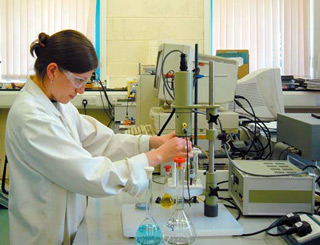| 2005 |

|
YEAR BOOK |
National University of Ireland, Maynooth
|
Smart biocompatible polymer materials in drug delivery systems
|

The concept of a 'smart' drug delivery system is that the drug is only administered at the target site when needed, as opposed to being released continuously. The advantages of such a controlled- delivery system are obvious: maximum effect of the drug, no wastage of the drug and minimal side effects. In order to devise a suitable technology, the drug delivery system must be responsive i.e. it must be capable of altering, in response to some stimulus, so that the drug is released in a controlled fashion when needed. When the drug is no longer required the stimulus is removed and the delivery system 'switches off' to retain the drug for future administration.
Researchers in the Department of Chemistry, NUIM, with funding from the Health Research Board, and in collaboration with the Department of Pharmacology at the Conway Institute in UCD, are investigating the possibility of using biocompatible polymeric materials that have the potential to respond to electrochemical signals. Drugs are encapsulated within the polymeric matrix. In the absence of a signal the drugs are bound to the polymer. However, the drugs are released in response to an electrochemical signal. Some of the target drugs in this study include valproate for the control of epilepsy, insulin for the regulation of glucose levels in diabetes and dopamine for the alleviation of the symptoms of Parkinson's disease.
|
|
Contact: Dr. Carmel Breslin or Dr. Denise Rooney,
Department of Chemistry, National University of Ireland Maynooth,
Co. Kildare, Ireland;
E-mail: [email protected] , [email protected] or Dr. John Lowry (UCD) [email protected]